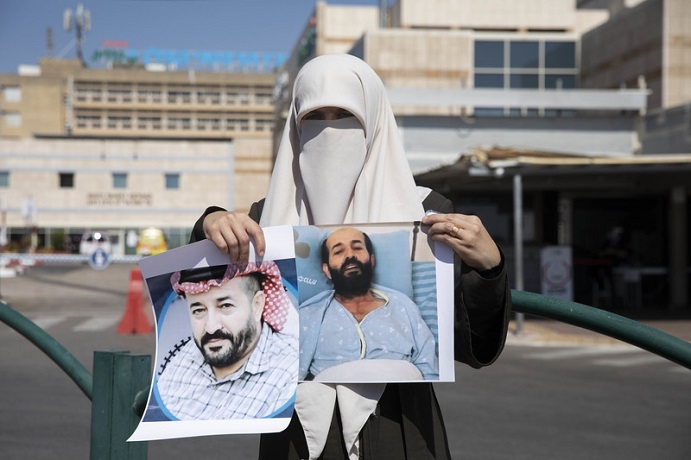
Tamara Nassar
The Electronic Intifada / November 3, 2020
“I don’t want to die at Kaplan hospital,” Maher al-Akhras said recently. “I want to die among my family and children.”
Al-Akhras has not eaten in 100 days.
The 49-year-old father of six is on hunger strike to demand that Israel release him from detention.
He has been held for more than three months without charge or trial – even in Israel’s military courts, where there is a nearly 100 percent conviction rate against Palestinians.
Al-Akhras is only taking water at the Kaplan Medical Center in central Israel, where he is detained.
He is experiencing “frequent seizures, acute headaches, significant weakness in his vision and hearing” and severe pain, the Palestinian Human Rights Organizations Council said on Monday.
It warned of the “serious and imminent threat to his life.”
Al-Akhras’ fast to the brink of death is “a quest to seek justice,” the council said, adding that he is protesting not only his own imprisonment, but also “Israel’s longstanding and unlawful policy of administrative detention.”
There are currently about 350 Palestinians held under administrative detention, a British colonial policy of detention without charge or trial continued by Israel.
Israeli forces arrested al-Akhras on 27 July and handed him a four-month administrative detention order, which can be renewed indefinitely.
Al-Akhras launched an open-ended hunger strike immediately after his arrest.
The BDS National Committee, the civil society coalition that leads Palestine’s boycott, divestment and sanctions movement, called “on solidarity groups worldwide to intensify pressure on Israel” to release al-Akhras “immediately and unconditionally.”
Punishment for political activity
Also in Israeli administrative detention is Khalida Jarrar, a member of the Palestinian Legislative Council, who was detained by Israel in October 2019.
Her arrest last year came only eight months after her release from a previous 20-month period in administrative detention.
Jarrar has spent years in Israeli prison and has been banned from traveling because of her membership in the leftist political party the Popular Front for the Liberation of Palestine.
This is like how Israel accuses al-Akhras of being a member of Palestinian political and resistance organization Islamic Jihad – which he denies.
Israel considers virtually all Palestinian parties and resistance organizations to be “terrorist” groups, meaning that any politically active person can be targeted for arrest.
Palestinian prisoners often suspend their hunger strikes after Israel agrees not to renew their administrative detention order.
Al-Akhras has refused such concessions, and is demanding immediate, unconditional release.
“My only conditions are freedom or death,” he said in a widely circulated video from his hospital bed.
Last week, Israel’s high court refused a petition from al-Akhras’ lawyer that he be transferred to a Palestinian hospital.
“I don’t want my body to be put in an [Israeli] freezer never to be autopsied,” al-Akhras recently said.
“I will not eat any food except in my home.”
“My family, my mother and my children, I love you so much,” al-Akhras added.
Meaningless “suspension”
The Israeli court has rejected all petitions to release al-Akhras, insisting that he remain imprisoned until the end of his current detention order on 26 November.
This is despite the court’s admission that he poses no possible threat in his medical condition.
The high court has put a “suspension” on al-Akhras’ administrative detention order.
But such freezes change nothing for the prisoner: Al-Akhras is still not free to leave the hospital and return home.
Last month, Israeli human rights group B’Tselem called the suspension “an interpretive solution invented by the high court” in order to avoid reaching a decision on – and taking responsibility for – administrative detainees on the verge of death.”
Al-Akhras’ persistence in his strike “does not allow the state and the court to continue avoiding a decision,” B’Tselem added.
EU fails to call for release
The European Union finally broke its silence on al-Akhras last Friday.
The bloc said it was “closely following” al-Akhras’ deteriorating medical condition, EU foreign affairs spokesperson Peter Stano said.
The EU called on Israel “to fully respect international humanitarian law” and “its human rights obligations towards all prisoners.”
It also called on Israel to “do all it can to preserve the health” of al-Akhras.
But the statement pointedly failed to condemn al-Akhras’ detention, or to call for his release.
The EU’s prolonged silence and bare-minimum statement is reminiscent of its lack of concern when Israel detained human rights defender Mahmoud Nawajaa earlier this year.
Nawajaa, the general coordinator of the BDS – boycott, divestment and sanctions – movement, was held and interrogated by Israeli occupation for 19 days before being released unconditionally.
Israel regularly arrests human rights defenders.
Earlier this month Khitam Saafin, the head of the Union of Palestinian Women Committees, and Muhannad al-Azzah, another human rights defender and activist, were both detained by Israeli forces.
Harassment of Palestinian activists and human rights defenders is part of Israel’s policy to “silence those who advocate and voice opposition to the Israeli occupation’s policies,” human rights group Addameer stated.
Michael Lynk, the UN special rapporteur for the occupied Palestinian territories, has also called on Israel to immediately release al-Akhras or to charge him with a crime based on evidence “that would be acceptable in any democratic state.”
Lynk said Israel must abolish administrative detention, which he called “anathema in any democratic society that follows the rule of law.”
Tamara Nassar is an assistant editor at The Electronic Intifada












